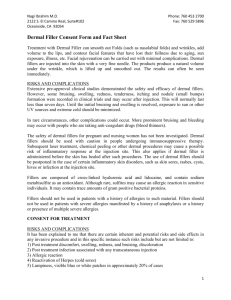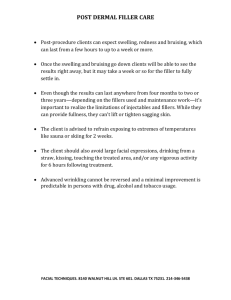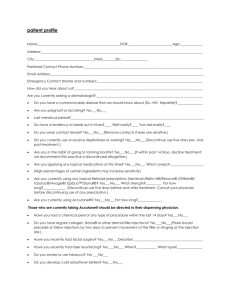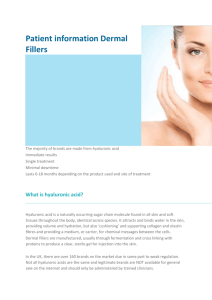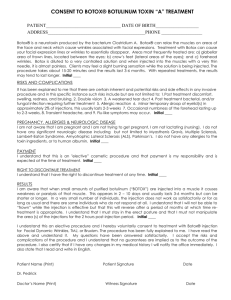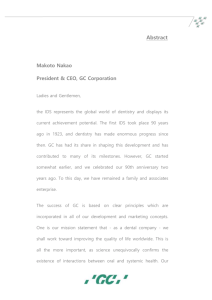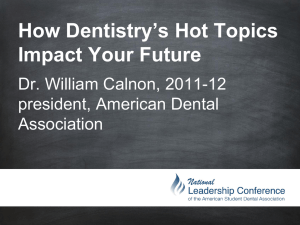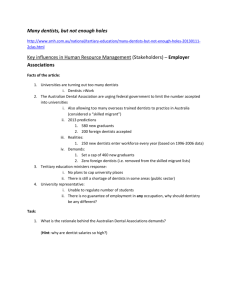March 7, 2014 Dear Colleagues, I recently had a meeting with the
advertisement
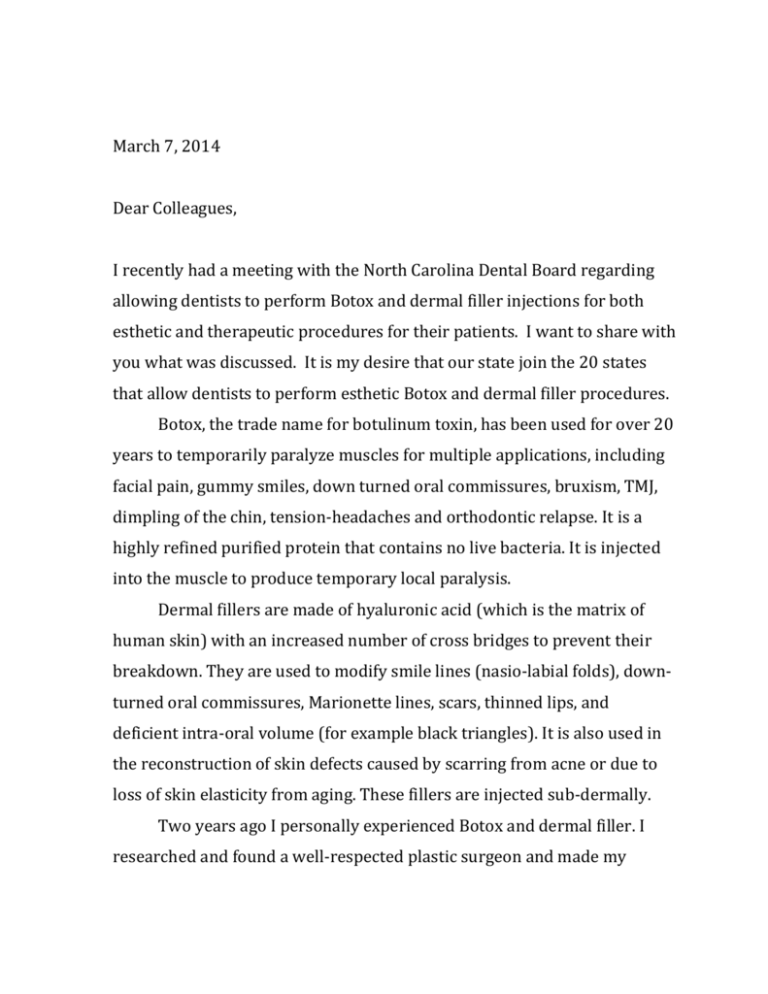
March 7, 2014 Dear Colleagues, I recently had a meeting with the North Carolina Dental Board regarding allowing dentists to perform Botox and dermal filler injections for both esthetic and therapeutic procedures for their patients. I want to share with you what was discussed. It is my desire that our state join the 20 states that allow dentists to perform esthetic Botox and dermal filler procedures. Botox, the trade name for botulinum toxin, has been used for over 20 years to temporarily paralyze muscles for multiple applications, including facial pain, gummy smiles, down turned oral commissures, bruxism, TMJ, dimpling of the chin, tension-headaches and orthodontic relapse. It is a highly refined purified protein that contains no live bacteria. It is injected into the muscle to produce temporary local paralysis. Dermal fillers are made of hyaluronic acid (which is the matrix of human skin) with an increased number of cross bridges to prevent their breakdown. They are used to modify smile lines (nasio-labial folds), downturned oral commissures, Marionette lines, scars, thinned lips, and deficient intra-oral volume (for example black triangles). It is also used in the reconstruction of skin defects caused by scarring from acne or due to loss of skin elasticity from aging. These fillers are injected sub-dermally. Two years ago I personally experienced Botox and dermal filler. I researched and found a well-respected plastic surgeon and made my appointment. Upon arriving, no medical history was taken, no consent forms signed, and there was no exam by the surgeon. After discussing my concerns and desires with the nurse, she proceeded to inject the Botox. A few weeks later I returned for the dermal filler. Again, no medical history, no consent, and no surgeon. Topical anesthesia placed for 35 minutes and again, the nurse injected the filler. Because these procedures are not permanent, I later sought out additional treatment, this time at another well-established, recommended and reputable facility. Again, there was no exam by the physician, only a nurse. No follow up appointments were scheduled. I experienced another facility with the exact same scenario as the first. The Botox injections were uncomfortable, but the dermal filler experience excruciating. I didn't question it because my assumption was this was the way it went with these types of procedures. Then it dawned on me. Why are dentists not performing these procedures? We have more academic training in head and neck anatomy, as well as more training and clinical experience than any other health care provider in administering injections to the head and neck. After these experiences, I invested 40 hours and thousands of dollars in coursework to become knowledgeable about these procedures. The courses I took were offered by the American Academy of Facial Esthetics and are AGD accredited and ADA recognized for training in the use of injectable Botox and dermal filler, both for therapeutic and esthetic purposes. These programs have trained over 8,000 dentists and health care providers nationally and internationally. I have been practicing dentistry in North Carolina since 2001. I am passionate about our profession and, more importantly, I greatly respect my patients and am humbled by the trust they place in me as their health care provider. I have very close relationships with my patients. This relationship goes beyond healthy gums and teeth. I am committed to being a comprehensive provider. The needs of today's patients are complex. Their fast-paced and busy lives demand comprehensive services from the providers they choose. The excitement of a healthier mouth, healthier habits, and esthetically pleasing smile, reach beyond the parameters of the oral cavity to encompass the entire face, and indeed the entire person. There is a growing demand by the public, as witnessed within my own practice, for esthetic enhancements of the face with Botox and dermal fillers. Patients consider these esthetic procedures to be natural extensions of the time, money and care they expend in improving and maintaining their dental health and beauty. It seems only natural that the dentist--the provider they already trust with caring for such a large portion of their health and appearance, one who is familiar with them and their medical histories, and one they feel comfortable asking questions of--should also be able to provide the esthetic services these patients are demanding. Dentists are held to a high standard of practice. We are the doctors that have been trained in the head and neck areas specifically and are responsible directly for our actions. Dentists can inject dental blocks that can significantly decrease the discomfort experienced during filler injections. Dentists are able to provide a better service to our patients. I learned from my own experience that patients can be reluctant to ask vital questions of the nurse injectors, and this reticence may increase the potential for compromised care. And there are questions that even I did not know to ask. Questions such as where, when, how are you qualified to inject Botox and dermal fillers? Questions, such as reconstitution ratios and expiration dates of the materials, and whether and what level of pain to expect after a procedure. Recently I was invited to a conference about the most recent FDA approved dermal filler. I sat in a room with some of the Triangle's most respected plastic surgeons, dermatologists and physicians. The concepts presented were within the scope of dentistry. Botox and dermal fillers are pharmacological agents just like the local anesthetics that we use on a daily basis. According to the NC General Statute 90-29(b)(1), we are allowed to work on "human teeth, gums, alveolar processes, jaws, maxilla, mandible or adjacent tissues or structures of the oral cavity." The board currently allows the treatment of migraines and TMJ with injections in the frontalis, masseter, and temporalis muscles. That means the board agrees that those areas are adjacent to, or near, the oral cavity. Further, nowhere in the NC General Statutes is there any differentiation made between esthetic and therapeutic procedures, as we are allowed to do veneers, crowns and whitening for purely cosmetic reasons without breaking any laws. In addition, Section 90-29(b)(10) allows dentists to "engage in any clinical practices included in the curricula of recognized dental schools or colleges." Botox and dermal filler course are now taught throughout the country in dental schools. Just look at the dental schools at University of Massachusetts, Tufts University, University of Maryland, or OSHU. All of these dental schools offer Botox and dermal filler courses. For me, the facts supporting dentists performing these procedures are clear. To summarize: 1. The NC General Statues allow Botox and dermal filler therapy according to Section 90-29(b)(10) because it is taught in accredited dental schools and in ADA and AGD annual meetings. "A person shall be deemed to be practicing dentistry in this State who does, undertakes or attempts to do, or claims the ability to ... perform or engage in any of the clinical practices included in the curricula of recognized dental schools or colleges" 2. The board allowing therapeutic injections in the frontal, masseter, and temporalis muscles suggests that those areas are considered adjacent structures to the oral cavity as defined in Section 90-29(b)(1): A person shall be deemed to be practicing dentistry in this State who does, undertakes or attempts to do, or claims the ability to ...diagnose, treat, operate, or prescribe for any disease, disorder, pain, deformity, injury, deficiency, defect, or other physical condition of the human teeth, gums, alveolar process, jaws, maxilla, mandible, or adjacent tissues or structures of the oral cavity." 3. The NC General Statutes do not differentiate between esthetic and therapeutic procedures. 4. In order for dentists to obtain malpractice insurance the board needs to be definitive in their interpretation of the NC General Statues. 5. We have a mutual obligation to protect the public. I welcome perspectives, feedback and support (919) 488-0111. Sincerely, Dr. Jennifer Le
